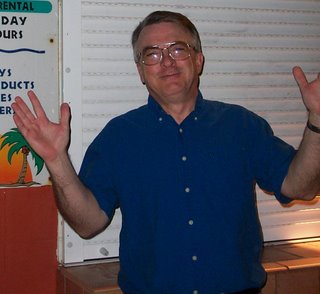I usually have several books in the process of being read at the same time. My office is always messy with books strewn about. Come over to the house and, at any given time, you're likely to see maybe a half-dozen books here and there which I am in the process of reading. Some I finish; some I lose interest and return unread to the library or to my shelves.
Yesterday, I received an order from Amazon which included a book I had known about for quite a while, but never read: Dr. Tom Olbricht's
Hearing God's Voice: My Life with Scripture in the Churches of Christ. I've never met Dr. Olbricht personally, but I am familiar with him from years of lurking on the Stone-Campbell restoration history discussion list where he is an active participant. I've read only the first hundred pages of this 450-page book so I'll wait to offer any kind of evaluation until I've read the whole thing. At this point, I can say only that Dr. Tom is a most capable writer who has the ability to make his memories of the church of his youth about as interesting as some of the whodunits I like to read.
However, early on in the book I caught him in a factual mistake. He said that the person who claimed that God does not hear the prayers of sinners was a Pharisee who opposed Jesus (p. 30). If he had gone back and reviewed John 9 before writing that paragraph, he would have remembered that it was the blind man healed by Jesus who spoke the words recorded in John 9:31.
I do not mention this factual error to criticize or embarrass Dr. Olbricht. Everybody--even talented writers --makes mistakes, especially so if they are not careful to do their homework. Ann Rule is a well-known true crime writer whose recent book
Smoke, Mirrors, and Murder includes a section on the Matthew and Mary Winkler case. According to Wayne Jackson, she included some inaccurate information about the Church of Christ in her discussion of the Winklers. Brother Jackson emailed Ms. Rule and offered her some gentle correction. He reported that she replied with a gracious note apologizing for the error and stating that she had based her comments "upon a fuzzy childhood memory, rather than current research." [
Jackson's article on Christian Courier web site]. In that case, Ann Rule failed to do her homework and she 'fessed up to it. That was the honorable thing to do and it, in no way, detracts from her reputation as a star writer in her field.
The same is true of Dr. Tom. I haven't called his error about the blind man to his attention because there is no need to do so. He would obviously admit the mistake because he was clearly incorrect in what he wrote. That just means that he slipped up on a detail that he should have caught, but it does not detract from the book or his ability as a writer or teacher.
All of us who preach are occasionally going to make those kind of errors. We shouldn't. In an ideal world, we would
always have our facts straight and say everything exactly right. However, it does not happen that way. We trust our memories when we shouldn't, either as we are writing sermons or we depart from our prepared material and go rabbit-chasing. Almost all preachers do that from time to time, and that impromptu speaking time is when we are most likely to say something wrong.
So, correct us gently when we misspeak. It is never right to be wrong, so I don't advise anybody to just let it slide if you catch a speaker in an error. However, it is not necessary to make a big deal out of the error unless you have substantial reason to think the speaker or writer is teaching intentionally something the Bible shows to be false. People who willfully go against the Bible deserve to be rebuked and condemned. Those who err because of tongue slips or faulty memories need to be corrected much more gently and carefully.

